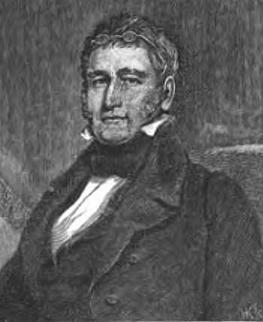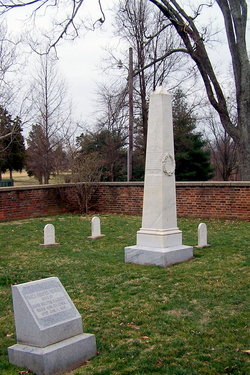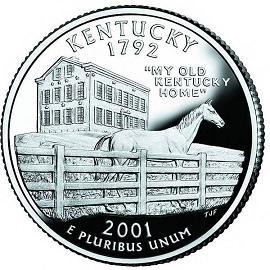The Moving Memorial
on Wednesday, June, 08 2011 11:11:00 pm , 1156 words
Categories: Uncategorized , 70378 views

One of the most famous politicians in the history of Kentucky was John Rowan. His distinguished career in law and public service, through which he gained his prominence, was long and varied. His life was an interesting mixture of lofty successes and heart-rending misfortunes. As fascinating as many of the events and accomplishments of his life and career were, likewise intriguing is the strange, repeated occurrence that has been associated with him in death.
Born near York, York County, Pennsylvania, on July 12, 1773, John was the son of Revolutionary War veteran William Rowan and Eliza (Cooper) Rowan. In 1783, the family moved to Louisville, Kentucky, where John received most of his early education, and in 1790, he settled in Bardstown, Nelson County, to begin his classical education at Salem Academy, then headed by Doctor James Priestly (later president of Cumberland College). He completed his studies in 1793. (Later, during the first and second decades of the new century, Rowan served as a trustee of Salem Academy and the subsequent Bardstown Academy.)
Rowan moved to Lexington, Kentucky, and studied law under Kentucky's first attorney general, George Nicholas. In 1795, he was admitted to the bar and commenced private practice in Elizabethtown. He became one of Kentucky's most eminent attorneys and was especially esteemed for his work as a defense counsel.
Politically he espoused the principles of the Democratic-Republicans, dedicated to individual liberty and limited government. He represented Nelson County in Kentucky's second constitutional convention, which convened in Frankfort on July 22, 1799. Adopted by the convention on August 17, the state constitution reflected Rowan's values of legislative superiority to the judicial and executive branches and for greater involvement of the populace in government. (It called for the direct election of the governor and state senators.) In 1800, Rowan removed to Frankfort to practice law in the Court of Appeals.
On February 3, 1801, Rowan fought a duel with Dr. James Chambers. On the night of January 29, a group of gentlemen, including Rowan and Chambers, were engaged in a game of cards at McLean's tavern in Bardstown. A conversation arose between the two over which was the better in speaking some of the ancient languages. Discussion became argument, which led to shoving and attempts at blows, prevented by the others present. Chambers's challenge ensued and the duel was fought about a mile and three-quarters south of Bardstown in the woods near Jacob Yoder's plantation on the Beech-fork. Chambers was killed, the pistol ball entering four inches beneath the left arm (which he had raised to support the pistol upon the left elbow). Rowan was arrested and brought to trial but acquitted due to insufficiency of evidence.
Though a tragic end to a socially and professionally prominent figure, the affair of honor had no effect upon John Rowan's political career. In 1804, he was appointed by Governor Christopher Greenup secretary of state. Elected in 1806, he represented Nelson County in Congress from March 7, 1807 to March 3, 1809. He was elected to represent Nelson County in the Kentucky House of Representatives from 1813 to 1817. Jefferson County, in 1822 and again in 1824, likewise elected him to the state house. From 1819 to 1821, Rowan was a judge in the Kentucky Court of Appeals. In 1824, he was elected to the United States Senate and served from March 4, 1825, to March 3, 1831, during which period he was chairman of the Committee on the Judiciary. Returning to Kentucky in 1831, he divided his time between Bardstown and Louisville. In 1838 he became the president of the Kentucky Historical Society, which position he held until his death. He was appointed a commissioner for carrying out the terms of the 1839 treaty with the Republic of Mexico.
Married to Agnes Anne Lytle on October 29, 1794, Rowan built the Federal-style mansion known as "Federal Hill" on property deeded by the bride's father, William Lytle, as a wedding gift. Composed of thirteen rooms from original construction in 1795, but completed through additions in 1818, this magnificent plantation home is today a cherished historical site which with 235-acres constitutes "My Old Kentucky Home State Park." A cousin of Judge Rowan was the composer Stephen Collins Foster who composed the song "My Old Kentucky Home" (first published in 1853). Folklore maintains that the mansion inspired the song but there is no conclusive proof that Foster ever visited Federal Hill, and the lyrics of the song concern an old and little cabin, not a mansion. Rowan was also the uncle (by marriage) of Ohio politician and Congressman Robert Todd Lytle.
Tragedy struck the Rowan home in July of 1833 when three children of John and Agnes Rowan and two of their spouses died from the second year of Asiatic cholera to hit Kentucky: daughter Mary Jane (Rowan) Steele; her husband, William Steele; son William Lytle Rowan; his wife, Eliza (Boyce) Rowan; and son Atkinson Hill Rowan. Rowan also lost 26 of his slaves to the dread disease. (Atkinson, named for his father's business partner, Judge Atkinson Hill, had served as diplomatic envoy to Spain representing the administration of President Andrew Jackson).
John Rowan died on July 13, 1843, in Louisville, Kentucky. Reportedly he instructed his family not to place a marker on his grave. It is said that he felt his mansion was memorial enough of his life and achievements. He further stated, so the story goes, that his father and mother had been buried in modest unmarked graves and for him to be buried otherwise would be disrespectful. He was first buried in Bardstown Cemetery, but later (apparently the late 1850's) his body was re-interred in the Rowan family cemetery at Federal Hill.
Feeling the need to mark his grave site with a memorial befitting his prominence, the family had a tall obelisk-style marker erected, listing his many achievements and offices. Within a short time of its placement, the stone due to no apparent cause toppled from its base. Stonemasons called in to reset it suggested that tree roots or ground settling may have been the cause. Just a matter of weeks later their services were again needed, the stone had fallen over a second time. Rumors began to spread that the dissatisfied spirit of John Rowan was manifesting his displeasure, and some of the workers refused to return to the site. Restored to its position, it soon fell yet again, this time directly onto the grave. Rumors grew yet stronger and stonemasons, by now certain that a restless spirit was to blame, refused to do any more work on the monument. Thence forth, cemetery caretakers have handled the task which has been necessitated from time to time throughout the years.
A memorial of a different sort was made by the Kentucky General Assembly in 1856 when the 104th county of the state was created from parts of Fleming and Morgan counties and named Rowan County. Perhaps that act was a commemoration more to the liking of John Rowan.


Photos: (Top) John Rowan. (Center) Grave and marker of John Rowan in Federal Hill Cemetery (Credit: RosalieAnn on Findagrave.com). (Bottom) Kentucky statehood quarter featuring Federal Hill in its reverse-side design (Credit: United States Mint).
